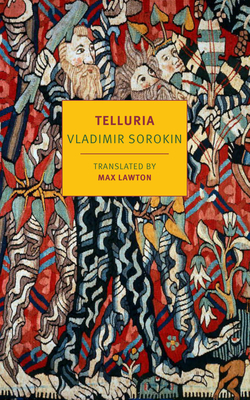Vladimir Sorokin
Translated by Max Lawton
New York Review Books ($18.95)
by Garin Cycholl
They say that those who live by the nail will probably die by the nail—that is, unless the nail is made of tellurium, set by a member of a guild of highly skilled technicians, and driven into one’s skull in a ritual that identifies the exact fold of the brain where the sharp, rare metal can awaken insight. That insight is the rub of Max Lawton’s newly released translation of Vladimir Sorokin’s 2013 novel, Telluria. What rough consciousness is emerging along our frontlines and glowing screens? How do we rescale our existence along these spaces in more human terms? These questions establish Telluria’s time and terrain.
Sorokin’s novel is told in fifty chapters. It explores the speculative, post-holy war geography of a dismembered Europe, in which a range of post-Putin Russian states has emerged on a redrawn map. Among these states, a nostalgia-tinged (i.e., ultra-Stalinist) post-Soviet Republic has reopened, and Telluria itself has developed as a 21st-century narco-state that traffics in rare metal nails that promise sudden revelation. A Great Wall of Russia, “one final imperial illusion,” re-marks the territory.
In this world, enlightenment is a commodity attained by having a nail made from tellurium driven into one’s head by a “carpenter” who uses a clothy, computer-like tablet (translated by Lawton as a “smartypants”) to map the nail’s precise target. The nail releases one from ordinary consciousness, a process that devotees ecstatically describe as having “rent asunder the chains of Time . . . the white-eyed executioner of hopes and expectations.”
The beauty of Telluria rises from the jagged music of our own expectations of this future world. Sorokin’s fifty chapters are widely divergent in tone and focus; they disarrange our dispositions to time. As history roughly unfolds around her, a distraught mother laments, “It’s unbearable . . . insanity growing up all around us like a crust of ice.” The human imagination of time itself is stretched out across this cold reality in Sorokin’s writing. Telluria offers a glimpse through our own moment into a distinctly medieval world that continues to work itself out along a shredded map of city-states and capital-driven fiefdoms. In doing so, the novel exposes busily disintegrating empires and their attendant exploitation, suffering, and flight. Against that chaos though, Sorokin pushes his readers to cease looking for signs in everything but themselves.
In an interview about the novel published at The Untranslated, Lawton posits, “Sorokin seems to almost long for the kind of ‘return to human scale’ offered by a collapse into medievaldom…There’s a thread of nostalgia for the long-past that runs through much of Sorokin’s work, always deconstructing itself even as it looks back wistfully.” This “thread of nostalgia” is evident in the translation’s tone; Lawton playfully “sounds” the range of centuries and prose styles in Telluria, whose medieval world unfolds through language. The land is mapped by belief and a new feudalism drawn from the remains of modernity. Simple things call human beings back into presence. Nomadic poets sing to endless steppes and dildoes speak of “peckerish labor.” All these alternative presents exist at once in Telluria.
In what could be an addendum to Brecht’s Mother Courage, two dog-men discuss poetry and the disposition of rational animals while stewing a pot of battlefield corpses. To eat or not to eat? One laments that “man is losing his nature.” They cannot eat without talk. In Beckett-like stasis, their conversation looks back on their journey as one plucks a bullet from his mouth. They dwell on skulls’ fragility. A tellurium nail boils up from the skull in the pot. One reflects, “Two metals met in the head of this warrior. . . . A sublime tragedy.” Anticipating the road ahead, they feast. One reminds the other, “You shall read your great poems to the Ocean!”
Does Telluria traffic in “hope”? Not really, but perhaps it deals in something equally essential in this historical moment. A military officer longs for psychic transport “back into the blessed and enlightened Middle Ages. The world returned to human scale.” How does one find that scale amidst battlefield corpses and humming smartphones? Maybe not through “hope,” though perhaps through its medieval cousin: a state of mind capable of fusing our present states of persistent dread and wonder. In provoking the reader to consider this possibility, Sorokin’s novel is a nail to the head.
Click here to purchase this book at your local independent bookstore:
Rain Taxi Online Edition Winter 2022-2023 | © Rain Taxi, Inc. 2023


